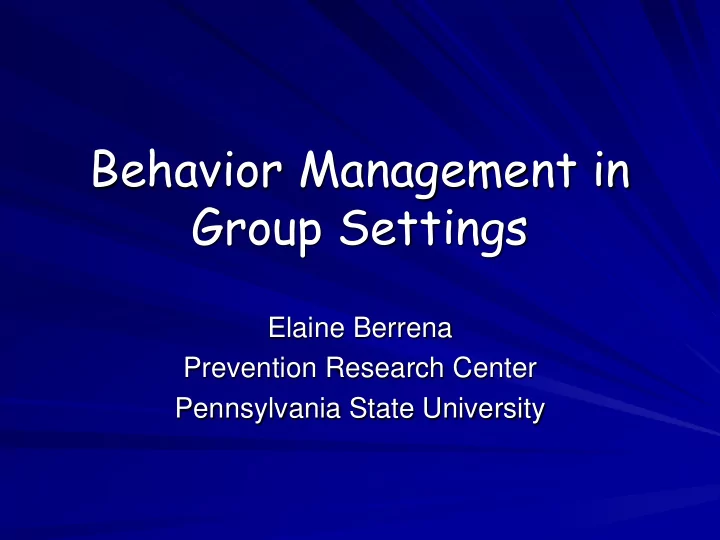

Behavior Management in Group Settings Elaine Berrena Prevention Research Center Pennsylvania State University
What causes behavior problems? Boredom Distractions in the environment Materials that are too hard, too easy, or not engaging enough Lack of appropriate limit-setting Lack of clear rules & structure Poor transitions Too much “down time”
What’s the best way to handle problem behavior? “An ounce of prevention is worth a pound of cure”
Coordinator’s Role in Promoting Facilitators’ Comfort & Confidence Articulate clear expectations Be approachable and supportive Prepare supplies/logistics appropriately Share time management strategies Share behavior management strategies Encourage advance facilitator preparation & division of responsibilities (agenda timeline) Debrief – Team problem-solving/Observation feedback POSITIVE REINFORCEMENT!
Engaging & Energizing Groups Make eye contact Move throughout the space/Approach participants Call on participants or ask for volunteers Validate/recognize participant responses and effort Give praise/compliments Play the games Use humor
Be enthusiastic! Have fun! Be energetic!
Create a Positive Environment Plan facilitator agenda ahead of session Use session agenda for participants Clear expectations/guidelines Take care of details Collaborate Be confident Remember…have fun!
Discipline Pyramid Timeout Response Costs Structured Reinforcement Systems Praise Induction & Positive Support Environmental Engineering
Prevention: Organizing the Environment Are your materials ready to go? Are they hands- on enough to keep everyone’s attention? Are they fun and engaging? Do you have exclusive control over the materials? Do you have back-up activities if these flop? Have you removed as many distractions as possible from the area? Can you “control your space”? (important in camp settings)
Discipline Pyramid Timeout Response Costs Structured Reinforcement Systems Praise Induction & Positive Support Environmental Engineering
Prevention: Managing the Group Position yourself strategically. Have challenging youth close to you Use proximity to help settle the crowd Make sure transitions are smooth Use positive comments that make kids feel that you’re on their side Have rules prominently displayed and discuss them with the group
Youth Session Ground Rules Listen to the speaker Take care of our place No fighting No put-downs
What can you do when environmental engineering & positive support don’t work?
Discipline Pyramid Timeout Response Costs Structured Reinforcement Systems Praise Induction & Positive Support Environmental Engineering
Positive group management plans Point systems: – Group earns “points” toward a reward – Anything can be used to indicate points: Marbles in a bowl, hash marks on the chalk board, etc. – Youth should know what they are working toward – Youth should know exactly what behaviors they need to display in order to get the reward – Reward needs to be motivating – Goal needs to be realistic so that youth can actually experience the reward
Potential Pitfalls of Point Systems Point systems should be well thought out They should be designed in a way that is not too cumbersome to run so they don’t get in the way of other activities There should be “just enough” of the reward to motivate the desired behavior, but not too much Misbehavior of one youth should not jeopardize things for the whole group
Behavioral Contracts Usually done individually Work better with older than younger children States very clearly what behaviors are expected States clearly what will happen: – If appropriate behaviors occur – If inappropriate behaviors occur
Youth Group Contract I agree to keep the following rules: Listen to the facilitators Take care of our place No fighting No put-downs Stay together If I follow these rules: I will get … If I do not follow these rules: I will get one warning I will need to take a time out with an adult I will need to discuss this with my parents/caregivers I also understand that if I destroy property or harm anyone, I will need to observe the activity rather than participate. Signed: Date: Witness:
Things to think about when you’re at the top of the pyramid What is your back-up? Do you have resources for providing extra support to challenging youth? Can you modify the activity so that problems are minimized?
Ways to Avoid Behavioral Escalation Watch your own emotions! If you are angry, upset, and making negative or sarcastic comments, this can make youth escalate their negative behavior Avoid confrontations, threats and sarcasm Use humor when appropriate When enforcing rules, be calm and offer choices whenever possible
Discipline Pyramid Timeout Response Costs Structured Reinforcement Systems Praise Induction & Positive Support Environmental Engineering
Point Systems & Response Cost Response cost means that youth lose points for misbehavior Important to make sure that youth actually earn the reward and don’t ever get into “negative points” Response cost can be effective if done right, but youth may become angry or resentful about losing points
Time Out Time out involves the removal of a youth from a situation where s/he is getting reinforcement for inappropriate behavior. The idea is to remove this reinforcement and allow the young person time to calm down and gain some self control
Ways to make time out work well Time out works best if it is done in a non-punitive way Time outs should be short and should end when the youth is calm and seems able to re-enter the group Youth should be complimented on their self-control in a private way after rejoining the group
Timeout may not work when… Youth continue to receive reinforcement while in timeout Youth prefer it to the activity Youth escalate and become very upset
Recommend
More recommend